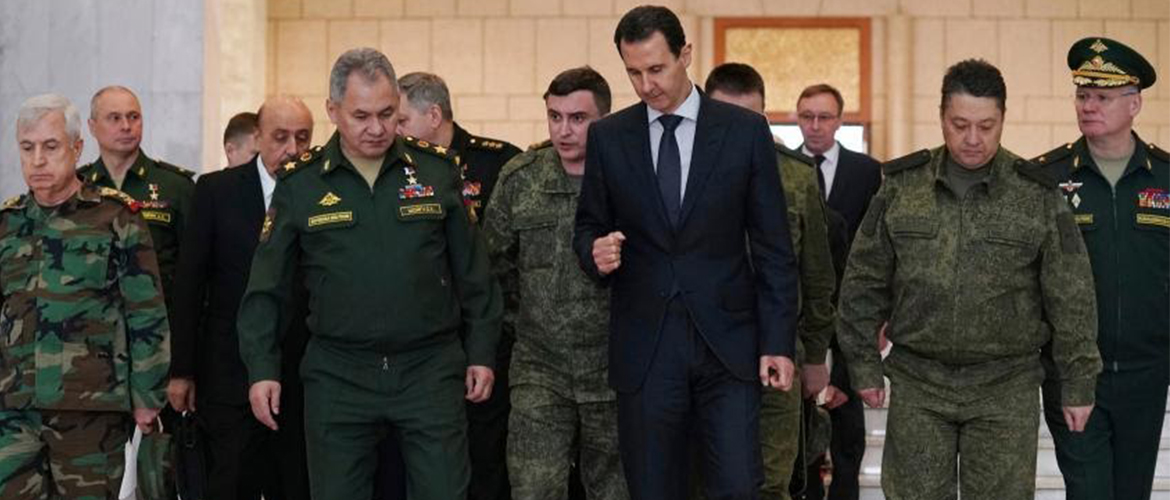Idlib: The last bastion in the Syrian Civil War
March 26, 2020 | Expert Insights

On 05 March 2020, Presidents Vladimir Putin of Russia and Tayyip Erdogan of Turkey, signed a historic agreement in Moscow. The agreement, signed after more than three hours of direct negotiations between the leaders, proposes to create a buffer zone along the strategic M4 Motorway, which dissects Idlib Province and will be jointly patrolled by Turkish–Russian forces. The M4 Motorway follows a West-East alignment, linking the port city of Latakia on the Mediterranean Sea, with Saraquib; covering a distance of 120 kilometres. The buffer-zone is to be cleared of both Syrian Army and rebel forces and will extend six kilometres wide, on either side of the highway. When the motorway is officially opened, it will be for the first time, in the last eight years. Significantly, the agreement does not call for the withdrawal of Syrian forces from newly captured territories.
Analysis: Russia and Turkey, back opposing sides in the Syrian Civil War. While Russia backs the Syrian Armed Forces of President Bashar Assad, Turkey backs some of the rebel groups holding out, in Idlib. On 28 Feb, 2020, 33 Turkish soldiers were killed in Idlib, in an air attack, attributed to Russian planes supporting Syrian forces. Turkey retaliated by bringing additional forces into the combat zone and attacking Syrian Army positions, under an operation code-named SPRING SHIELD. For the present, an uneasy ceasefire appears to be holding out.
Assessment: Prior to the Moscow Agreement, it appeared the stage was set for war between Syria and Turkey. Turkey’s interests lie in controlling erstwhile Syrian territory, immediately south of their border, including Idlib. Turkey hopes to re-settle majority of their 3 million Syrian refugees in this area and ensure that the region does not become a base for Kurdish insurgents, seeking separation from Turkey.
Refugee Crisis in Turkey
Since 2015, Turkey has been suffering an escalating refugee crisis, on its’ Southern Border with Syria. In 2019, the UNHCR estimated that there were 3.7 million Syrian refugees in Turkey. President Erdogan has repeatedly sought assistance from Russia, EU and the US to mitigate the refugee crisis. He has also proposed that Idlib be declared a safe-zone, to stem the flow of refugees, into Turkey.
Assessment: For the present, with the tenuous ceasefire, Turkey’s primary interest, to stem the flow of Syrian refugees, appears to have been met. However, this arrangement cannot be construed as a long-term solution. Syria has a legitimate claim to the territory of Idlib, and it is far-fetched to assume that the rebels can be assimilated into Syrian nationalism.
Who is Fighting in Idlib?
Idlib is the NW Province of Syria, which along with parts of Hama, Latakia and Aleppo, is the last stranglehold of rebel and jihadist groups. These groups were never united and were independently attempting to overthrow President Bashar Assad, since 2011. Prior to 2015, when the Russia-Iran-Syria axis was formed, these groups controlled large parts of the country. However, since then the Syrian Army, with the help of Russian air power and Iran-backed militia men, have retaken most of the territory, except for Idlib.
By estimates, there are still about 3 million people living in Idlib; and, about half of them have come from other parts of Syria, displaced by the nine-year-long civil war.
Analysis: At this juncture, several rival factions control the territory of Idlib. However, the dominant force is the al-Qaeda-linked Hayat Tahrir al-Sham (HTS). Some of the other groups, have in the past, received support from Western power-brokers, who were invested in removing President Bashar Assad. But now that President Assad is back, the people feel trapped; unable to find refuge in Turkey and being closed in by the Syrian Army.
Overall Assessment: With the US strategic withdrawal from Syria in October, 2019, Turkey needs to negotiate directly with Russia. Unfortunately, Turkey’s position is fundamentally weak; the HTS and other militant groups are hardly beholden to Turkey, and there is little security for people, in a safe-zone administered by militant groups, including UN proscribed terrorist organizations. The Moscow Agreement is at best a truce in the conflict, which is yet to play out.
“It is time to put armed conflict on lock-down and focus together on the true fight of our lives – a common enemy, COVID – 19, which doesn’t care about nationality or ethnicity, faction or faith”.
Antonio Guterres, UN Secretary General








Comments